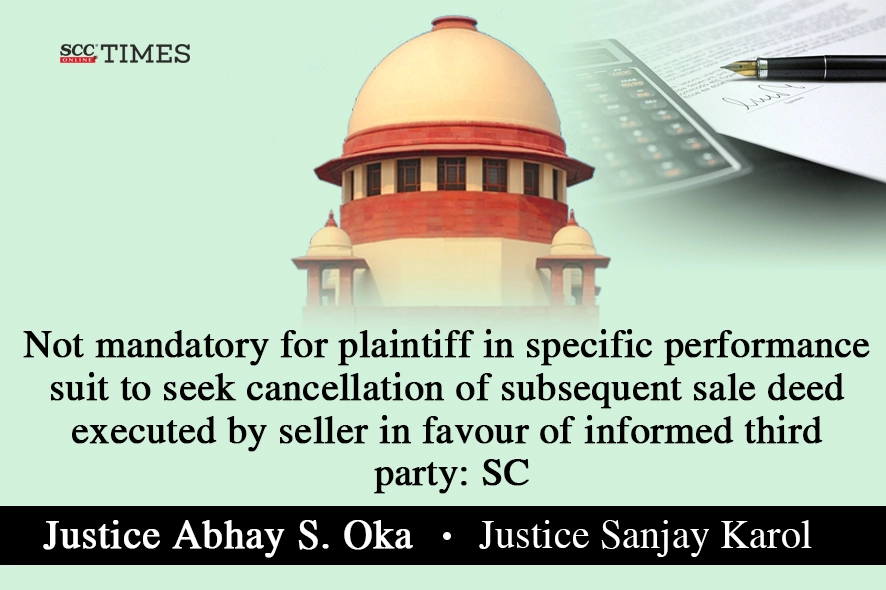Supreme Court: The Division Bench of Abhay S. Oka* and Sanjay Karol, JJ. held that where Section 19(b) of the Specific Relief Act, 1963 is applicable, under the decree of specific performance, the subsequent purchasers can be directed to execute the sale deed along with the original vendor and that there is no necessity to pray for the cancellation of the subsequent sale deeds.
Factual Matrix
The first defendant in the original suit executed a registered agreement for sale dated 01-12-1981, agreeing to sell his land in favour of the original plaintiffs for the consideration of Rs. 20,300/-. There was a recital in the registered agreement (‘suit agreement’) that the first defendant had received a sum of Rs. 7,000/- as advance and the balance consideration was payable at the time of execution of the sale deed. The first defendant agreed to execute the sale deed within three years from the date of the suit agreement. According to the plaintiffs’ case, requests were made orally and by sending notices to the first defendant to execute the sale deed. In 1983, the first defendant sold some part of the suit property to the second and third defendants (‘appellants’). By another sale deed, he sold the remaining part of the suit property to the second and fourth defendants. The prayer in the original suit was for specific performance of the suit agreement with a direction to the appellants to hand over possession of the suit property to the plaintiffs and to execute a sale deed in respect of the suit property in their favour.
The Trial Court held that the execution of the suit agreement was proved, and the Additional District Judge confirmed its decision. It was held that it was the duty of the defendants to take a search in the office of the Sub-Registrar to ascertain whether there was any prior transfer, hence, they could not be held to be bona fide purchasers for value received. Therefore, the Trial Court passed a decree for the specific performance, directing all the defendants to execute the sale deed and deliver possession of the suit property to the plaintiffs. The Additional District Judge, confirmed all the findings of the Trial Court, dismissing the appeal. The second appeal was dismissed by the impugned judgment.
Analysis and Decision
-
Can the contention that the suit agreement was sham and bogus and not intended to be acted upon be allowed to be raised notwithstanding Sections 91 and 92 of the Evidence Act, 1872?
-
Was the suit agreement sham and bogus and not intended to be acted upon?
The Court reiterated that Section 91 of the Evidence Act excludes oral evidence of the terms of the written document by requiring those terms to be proved by the document itself. Section 92 excludes oral evidence for contradicting, varying, adding to or subtracting to such terms. These two sections do not prevent parties from adducing evidence on the issue of whether the parties to the documents had agreed to contract on the terms set forth in the document. The Court noted that it was merely stated by the legal representative of the first defendant that a fictitious agreement without any consideration to deter the first defendant from selling the land was prepared. The Court said that the contention that the deceased-first defendant was addicted to vices was never raised in the written statements and the same came as an afterthought in the evidence of the mother of the first defendant. Moreover, the stand of the appellants in their written statement is that the suit agreement was forged and was prepared by the plaintiffs and some persons of their party. Therefore, the contention that the suit agreement was executed from the first defendant with the object to deter him from selling the suit property to meet the demands of his bad lifestyle, was unacceptable. Hence, the Court held that the suit agreement could not be held as bogus or sham.
-
Whether, in view of B. Vijaya Bharathi v. P. Savitri, (2018) 11 SCC 761, the plaintiffs were not entitled to a decree of specific performance in the absence of any prayer for cancellation of the two subsequent sale deeds?
Regarding the plaintiff’s contention that they ought to have prayed in the suit to cancel the subsequent sale deeds executed by the first defendant, the Court relied on Durga Prasad v. Deep Chand, (1953) 2 SCC 509 and held that here was no requirement to make a prayer in the plaint for cancellation or setting aside the subsequent sale deeds. Further, the Court held that the appellants who are claiming under the sale deeds executed after the execution of the suit agreement can be subjected to a decree of specific performance as the suit agreement can be enforced specifically against such appellants unless they are bona-fide purchasers without the notice of the original contract. The Court also said that when, the defendants, who are subsequent purchasers, fail to prove that they entered into the sale deed in good faith and without notice of the suit agreement, in view of Section 19(b), a decree for specific performance can be passed against such defendants. Therefore, in such a case where Section 19(b) is applicable, under the decree of specific performance, the subsequent purchasers can be directed to execute the sale deed along with the original vendor. There is no necessity to pray for the cancellation of the subsequent sale deeds.
-
Whether the plaintiffs are entitled to a decree of specific performance?
The Court said that the first plaintiff proved the service of notice of demand to the first defendant. The suit is filed within limitation, and the defendants did not raise a plea of delay and laches. Regarding the question that what is the effect of the failure of the second plaintiff to support the first plaintiff and his conduct of supporting the defendants, the Court on perusal of their submissions, said that as the second plaintiff was not interested in getting the specific performance, the decree ought to have been restricted to the undivided one-half share in the suit property in favour of only the first plaintiff.
Hence, the Court partly allowed the appeal and passed the following orders:
-
Modify the impugned decree by directing the legal representative of the appellants to execute a sale deed in favour of the first plaintiff only to the extent of one-half undivided share in the suit property;
-
The defendants shall join the first plaintiff in applying to the State Government/Competent Authority for the grant of permission under clause (h) of sub-section (2) of Section 154-B of the Zamindari Abolition Act to sell the one half-undivided share in the suit land to the first plaintiff within two months from today.
-
If the defendants or any of them do not sign and file the application with relevant documents within the period mentioned above of two months, the executing Court shall appoint a Court Commissioner to sign and file the application on their behalf and to do all such things which are necessary to get the permission;
-
If the application for grant of permission is rejected, it will be open to the first plaintiff to challenge the order of rejection in accordance with law. If the application for grant of permission is finally rejected, there shall be a decree for refund of the sum of Rs. 7,000/- against the legal representative of the first defendant together with interest thereon at the rate of 8 per cent per annum from the date of filing of the suit till the realisation. However, her liability shall be restricted to the extent of the estate of the first defendant inherited by her;
-
If the State Government grants permission, the sale deed shall be executed in terms of clause (a) by all the defendants within three months from the date of grant of the permission;
-
Even if a sale deed is executed in favour of the first plaintiff in respect of the one-half undivided share in the suit property, he will not be entitled to seek possession in the execution of this decree as he will be at liberty to file a suit for general partition.
CASE DETAILS
|
Citation: Appellants : Respondents : |
Advocates who appeared in this case For Petitioner(s): For Respondent(s): |
CORAM :









Very helpful judgement